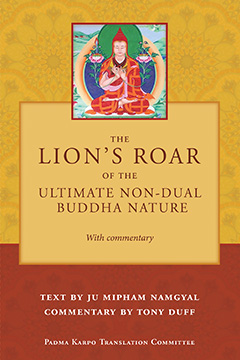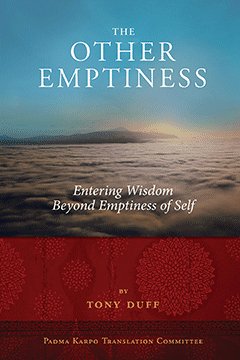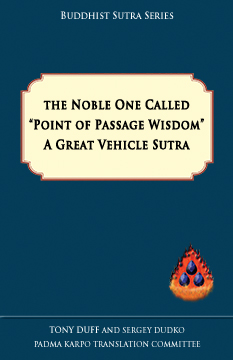AN IMPORTANT NEW DHARMA BOOK
In this newsletter we announce our latest book. Practitioners who have previewed the book have made comments like "This is an important book, it is very good, very helpful" and "It provides excellent material for all Great Vehicle practitioners. Especially, it opens an important topic within Mahamudra and Dzogchen that has not been explained in English to date."
This book is especially important because it clearly shows the ultimate teaching of the Buddha. The Buddha's ultimate teaching is often thought of as something from the tantras such as Mahamudra or Dzogchen, but in fact, it was taught in the sutras to begin with then later in the tantras. Both this ultimate sutra teaching and how it is none other than the highest teachings of Mahamudra and Dzogchen are clearly explained in this book.
The important topics in this book have not been clearly explained in English till now, so this book is essential reading for every Tibetan Buddhist practitioner. And of course it is especially important for practitioners of Mahamudra and Dzogchen. It is so important that the author, Lama Tony Duff, will be using this book as the basis for his teachings to be given this summer and autumn to practitioners in Europe and the USA.
- Read an extensive explanation and purchase from us at PKTC
- Purchase from Namse Bangdzo (good for the Americas)
- Purchase from Wisdom Books (good for Europe and the rest of the world)
- You can get all of our books through Amazon but it is better for everyone if you purchase through one of the sellers above
The book above contains core material concerning the Other Emptiness view. There has been a lot of talk about Dzogchen and Mahamudra outside of Tibet but most of the talk has focussed on high-level, secret teachings. Very little of the basic view that is so essential to practitioners of those paths has been made available. PKTC has made a point of publishing books containing translations of the relevant texts combined with extensive explanations, so that practitioners could have a better understanding of the Buddha's teaching in general and the high-level teachings of tantra in particular. Here are three of the many books we have published. Several more major works from the Nyingma tradition that clearly show the view of Dzogchen are underway.
• The Other Emptiness, Entering Wisdom Beyond Emptiness of Self
The topic of other emptiness was taught in a series of sutras of the third turning of the wheel. Other emptiness is the view of Kagyu and Nyingma and all the masters of those traditions such as Karmapa and Longchenpa proclaim that to be so. This book presents a comprehensive treatment of the ultimate meaning taught in the sutras and especially shows that other emptiness is the final view, in both sutra and tantra. You can read our review of the book and purchase it here.
The topic of other emptiness was taught in a series of sutras of the third turning of the wheel. Other emptiness is the view of Kagyu and Nyingma and all the masters of those traditions such as Karmapa and Longchenpa proclaim that to be so. This book presents a comprehensive treatment of the ultimate meaning taught in the sutras and especially shows that other emptiness is the final view, in both sutra and tantra. You can read our review of the book and purchase it here.
• The Sutra Petitioned by the Householder Uncouth
This is a most unusual discourse. The Buddha is asked by a householder bodhisatva named Uncouth whether it is possible to remain a householder and successfully practise the deeper teachings. The Buddha gives a long reply that just excoriates the life of a householder then greatly lauds monastic life. The audience thinks that that is the answer and a large group of householder bodhisatvas immediately ask for ordination. Notably, Uncouth does not. Instead he inquires further about this matter. The Buddha gives a further long answer again making it seem that it is better to be ordained. However, by the end of the sutra, the Buddha has shown that householder bodhisatvas like Uncouth are much more capable of living the true bodhisatva life and much more capable of benefitting sentient beings than the monastics. Together with this, the Buddha makes statements about non-dual wisdom which make this sutra into one of the ultimate meaning sutras. This is a fascinating sutra which, when properly understood, teaches non-dual wisdom as the final meaning and definitively answers the question of whether one should be ordained or not. The book features a long introduction that clearly draws out all of the threads of this amazing sutra. You can read our review of the book and purchase it here.
This is a most unusual discourse. The Buddha is asked by a householder bodhisatva named Uncouth whether it is possible to remain a householder and successfully practise the deeper teachings. The Buddha gives a long reply that just excoriates the life of a householder then greatly lauds monastic life. The audience thinks that that is the answer and a large group of householder bodhisatvas immediately ask for ordination. Notably, Uncouth does not. Instead he inquires further about this matter. The Buddha gives a further long answer again making it seem that it is better to be ordained. However, by the end of the sutra, the Buddha has shown that householder bodhisatvas like Uncouth are much more capable of living the true bodhisatva life and much more capable of benefitting sentient beings than the monastics. Together with this, the Buddha makes statements about non-dual wisdom which make this sutra into one of the ultimate meaning sutras. This is a fascinating sutra which, when properly understood, teaches non-dual wisdom as the final meaning and definitively answers the question of whether one should be ordained or not. The book features a long introduction that clearly draws out all of the threads of this amazing sutra. You can read our review of the book and purchase it here.
• The Point of Passage Wisdom Sutra
This second sutra is a very short but important sutra. It is regarded as one of five sutras that condense the entire meaning of the Buddha’s teaching. An extensive explanation of the sutra and its importance within all the sutras is provided in the introduction. You can read our review of the book and purchase it here.
This second sutra is a very short but important sutra. It is regarded as one of five sutras that condense the entire meaning of the Buddha’s teaching. An extensive explanation of the sutra and its importance within all the sutras is provided in the introduction. You can read our review of the book and purchase it here.


